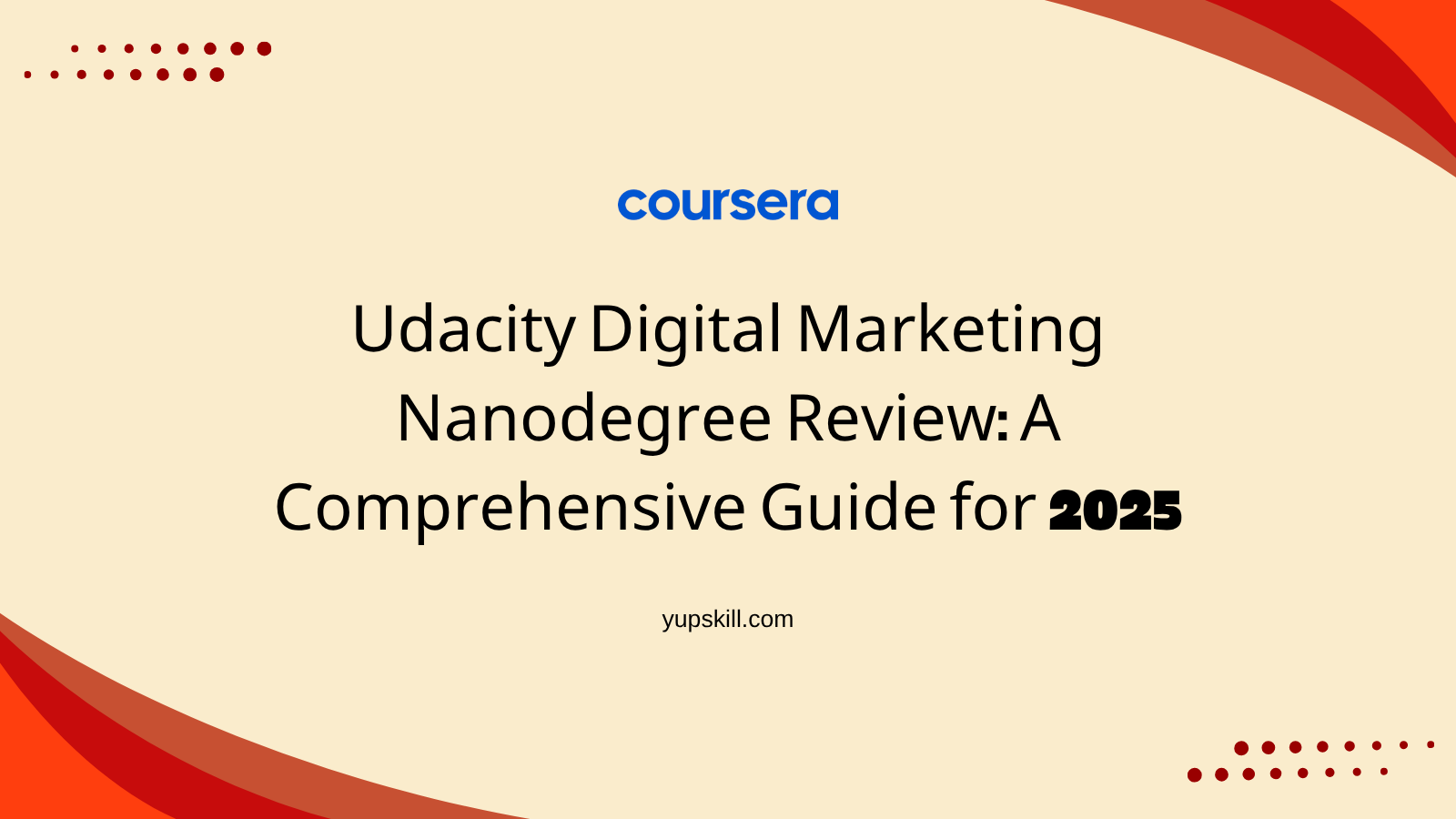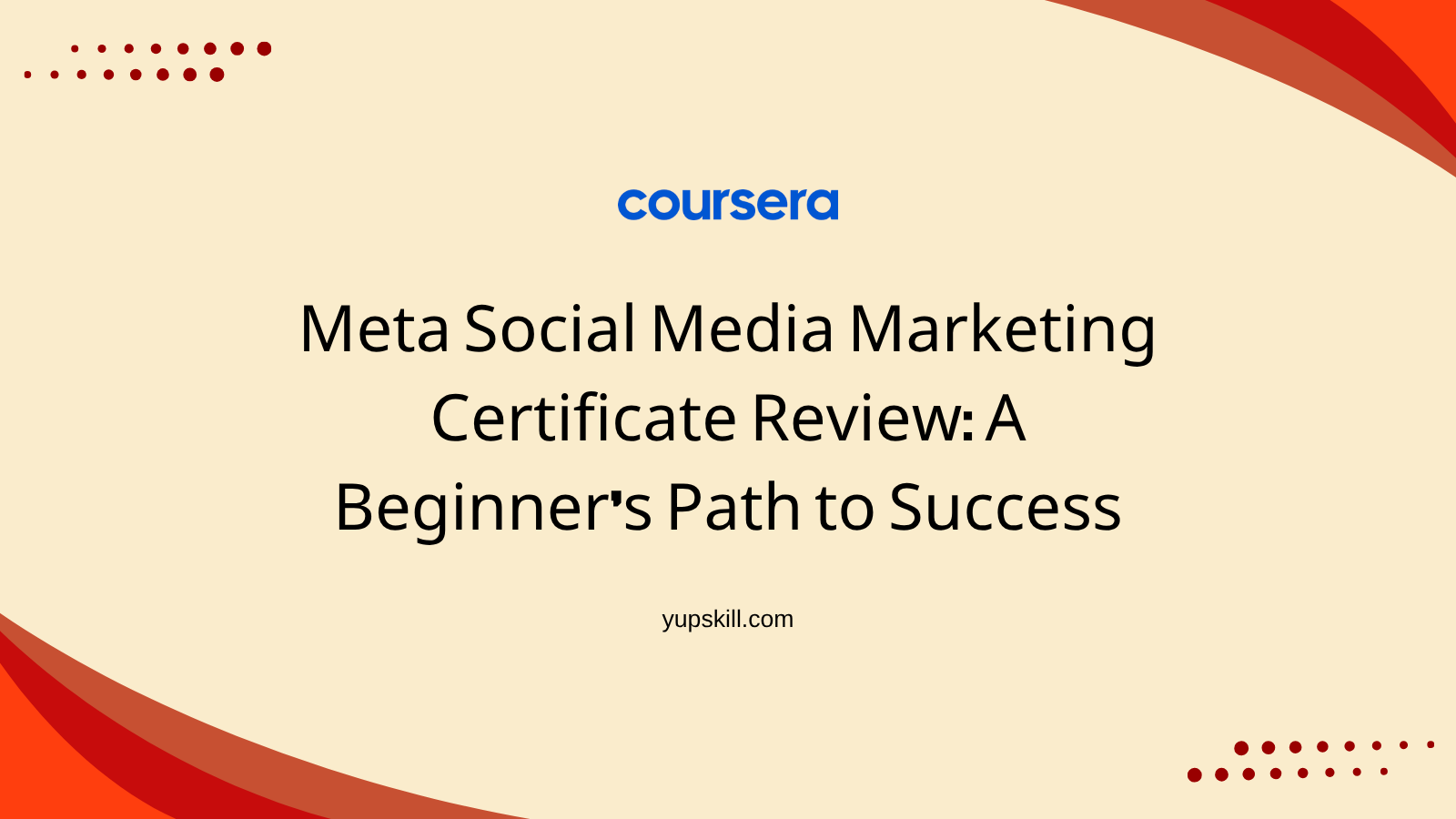In the rapidly growing world of online education, two platforms stand out for those interested in data science and analytics: Coursera and DataCamp. Each has its own unique approach, strengths, and weaknesses, and the choice between them depends on what kind of learning experience you are seeking. Whether you’re a beginner looking to dip your toes into data science or a professional aiming to upskill, this comparison will help you determine which platform is the best fit for your needs.
Overview of Coursera and DataCamp
Coursera

Founded in 2012 by two Stanford professors, Coursera has quickly become one of the largest online learning platforms in the world. With over 7,000 courses in a variety of subjects, Coursera provides learners with access to content from top universities, such as Stanford, Yale, and the University of Michigan, as well as leading tech companies like Google and IBM. The platform has something for everyone, from beginners to advanced learners, and is ideal for anyone looking for formal credentials in their field.
DataCamp
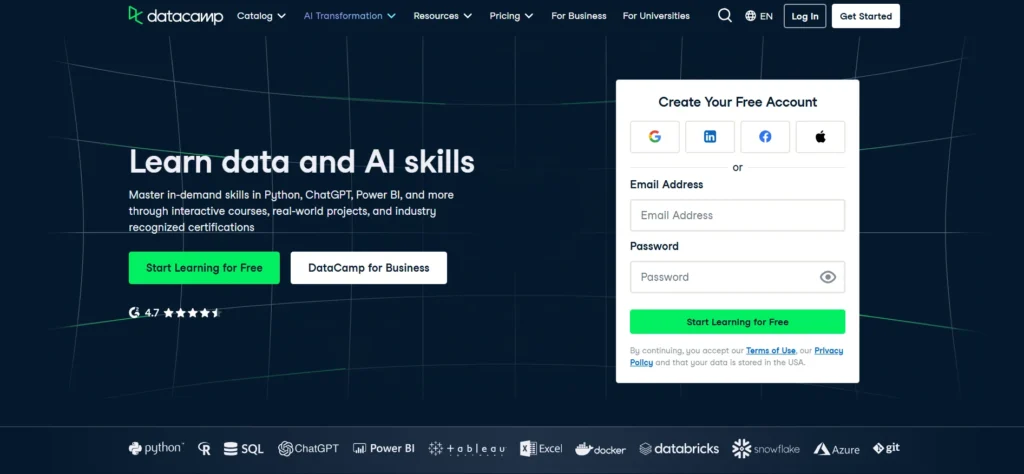
On the other hand, DataCamp is a more niche platform that specifically caters to learners interested in data science, analytics, and programming. Launched in 2013, DataCamp has positioned itself as the go-to online learning platform for people looking to gain practical, hands-on experience with data. Unlike Coursera, which offers a wide range of subjects, DataCamp focuses exclusively on the technical and data-driven fields of data science, machine learning, and artificial intelligence. It offers an engaging, interactive learning experience designed to build practical skills in areas like Python, R, SQL, and data visualization.
Course Offerings and Specializations
Coursera: A Broad Range of Subjects
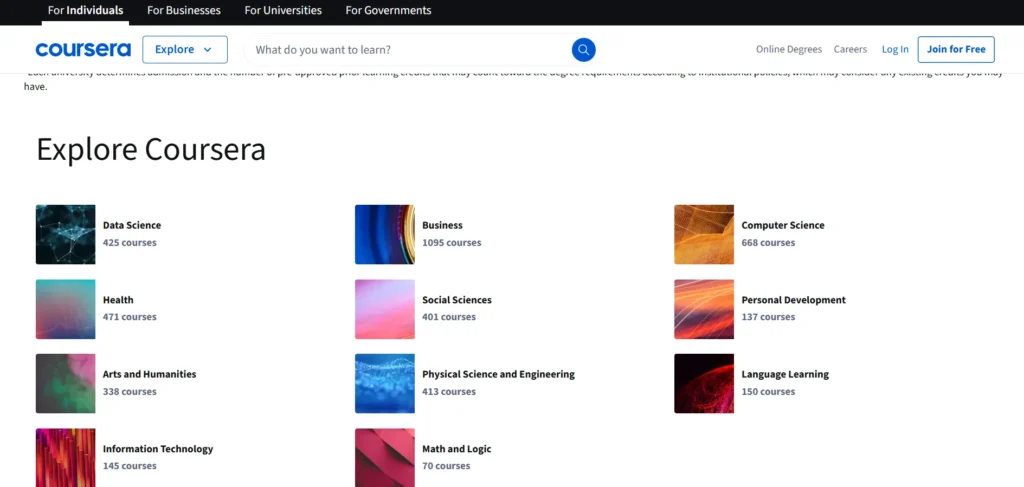
Coursera is an all-encompassing educational platform that provides access to thousands of courses in a variety of fields. Whether you’re interested in learning about business, personal development, arts and humanities, computer science, or data science, Coursera likely has a course that fits your needs.
1. Individual Courses: These are single courses designed to teach a specific skill or topic. They can be completed at your own pace, and once finished, you receive a certificate that can be added to your LinkedIn profile or resume.
2. Specializations: Coursera’s specialization offerings are a sequence of related courses that aim to deepen a learner’s expertise in a specific area. Each specialization ends with a capstone project that allows learners to apply what they have learned in real-world scenarios.
3. Professional Certificates: These certificates are designed for people looking to build skills that are highly valued by employers. For example, Google and IBM offer professional certificates in fields such as IT support, data analytics, and project management.
4. Degree Programs: Perhaps the most significant aspect of Coursera is its degree programs. Coursera offers accredited bachelor’s and master’s degrees in partnership with prestigious universities, such as the University of Illinois and the University of London. These degrees can be a game-changer for anyone looking to earn an accredited qualification without attending a traditional university.
DataCamp: Data Science Focused
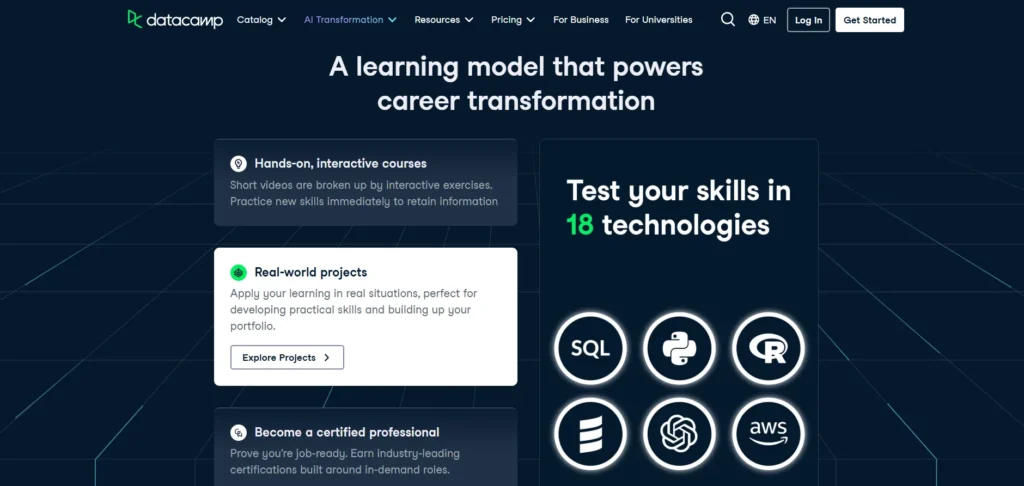
DataCamp, in contrast, has a more narrow focus, offering just over 430 courses (as of now) dedicated to data science, analytics, and programming. While it does not offer the sheer breadth of Coursera’s catalog, DataCamp excels in the areas it covers.
1. Career Tracks: These are structured learning paths designed to help learners acquire the skills needed for specific jobs in the data science field. For instance, the Data Scientist career track covers everything from Python and R to machine learning, SQL, and data visualization.
2. Skill Tracks: These are shorter learning paths that focus on a specific skill within the realm of data science. For example, you might complete a Skill Track on SQL or Tableau to gain proficiency in those tools. Skill Tracks are perfect for those who want to quickly build expertise in a specific area.
3. Projects and Challenges: DataCamp places a heavy emphasis on hands-on learning. The platform offers a variety of coding challenges and projects that allow learners to apply what they’ve learned in a real-world context. These are great for reinforcing new skills and ensuring that learners can use the tools they’ve learned in actual data scenarios.
4. Interactive Learning: Unlike Coursera, which relies heavily on video lectures, DataCamp’s courses are entirely interactive. Learners write and execute code directly in their browser, receiving instant feedback and hints when necessary. This hands-on approach helps learners get a feel for what it’s like to work with data in a professional environment.
Learning Experience
Coursera: A Structured, Academic Approach
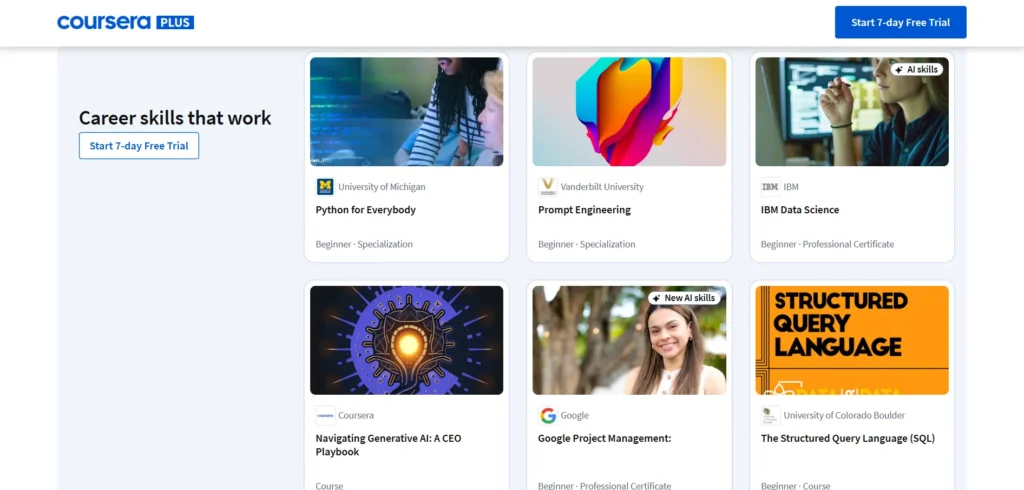
Coursera adopts a more traditional approach to online learning. Here, you’ll find video lectures delivered by professors and industry experts, often accompanied by readings, quizzes, and peer-graded assignments. While Coursera’s courses are highly structured, they often include long video lectures and assignments that can take a significant amount of time to complete.
- Video Lectures: Coursera courses are typically divided into weekly modules, with each module featuring one or more video lectures. These lectures can be quite in-depth, often lasting 10 to 30 minutes each.
- Assessments: Throughout the course, you’ll be required to complete various assignments and quizzes. Some courses also include peer-graded assignments or exams, which provide an extra layer of learning and allow you to interact with fellow students.
- Discussion Forums: Coursera also offers discussion forums where learners can ask questions, share insights, and connect with peers. This can be a valuable resource for problem-solving and networking.
While Coursera’s platform is robust and academic, it can be slow-paced for learners looking to acquire skills quickly. The emphasis on theory and exams might feel overwhelming for those focused solely on practical skills.
DataCamp: Interactive and Hands-On
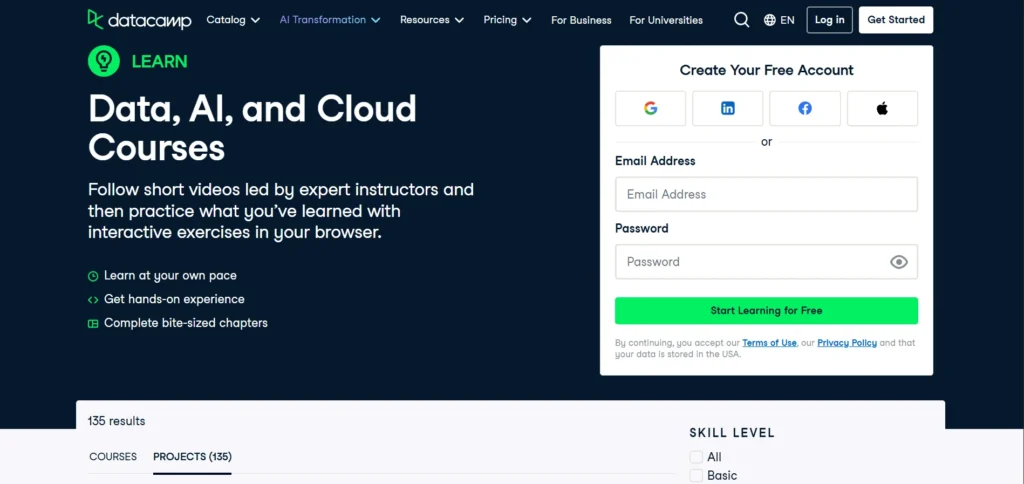
DataCamp’s learning approach is centered around coding and hands-on practice. Rather than relying on long video lectures, DataCamp’s courses are built around interactive coding exercises that allow learners to write and test code directly in their browser.
- Interactive Code: DataCamp’s primary method of teaching is through interactive coding exercises. Learners write code in real-time, which provides an immediate learning experience. You’re not just watching videos; you’re actively learning by doing.
- Instant Feedback: When learners make mistakes, they are given instant feedback to help them learn from their errors. This is invaluable for beginners who need to understand why their code doesn’t work and how to fix it.
- Gamification: DataCamp incorporates elements of gamification to keep the learning process engaging. You earn points, badges, and certificates as you progress through courses, which provides motivation and rewards for continued learning.
- Real-World Projects: DataCamp allows learners to apply their skills in real-world projects. These projects cover a wide range of industries and are designed to give learners a practical, hands-on experience with data.
Overall, DataCamp offers a far more interactive and engaging experience than Coursera. It’s perfect for learners who want to dive straight into coding and data manipulation without being bogged down by lengthy lectures and theoretical concepts.
Pricing
Coursera: A Flexible Pricing Structure
Coursera operates on a subscription model, though pricing varies depending on the course or program. Here’s an overview of their pricing structure:
- Individual Courses: Most individual courses cost between $39 and $99 per month, depending on the course’s length and depth. These courses allow you to learn at your own pace and earn a certificate upon completion.
- Specializations: Specializations are typically priced between $39 and $79 per month. Since specializations consist of multiple courses, they tend to be more expensive than individual courses, but they provide a more comprehensive learning experience.
- Coursera Plus: Coursera also offers a subscription service called Coursera Plus, which costs $59 per month. This plan grants access to the majority of Coursera’s courses, specializations, and certificates.
- Degree Programs: The cost of degree programs can vary greatly, depending on the university and field of study. For example, a Master’s degree in Data Science might cost upwards of $10,000 to $15,000, making it an affordable option for a graduate degree compared to traditional in-person programs.
DataCamp: Affordable and Subscription-Based
DataCamp operates on a subscription-based model, and pricing is relatively simple:
- Free Plan: DataCamp offers a free plan that gives you access to the first chapter of each course. This is ideal for beginners who want to explore the platform before committing.
- Premium Subscription: DataCamp’s premium subscription costs $29 per month or $300 per year. This plan gives you full access to all courses, career tracks, and real-world projects.
- Team Plans: DataCamp also offers team subscriptions for organizations that want to train multiple employees. Pricing for team plans varies depending on the number of users and the features required.
Certifications
Coursera: Accredited and Recognized Credentials
One of the key benefits of Coursera is its association with top-tier universities and institutions. This means that the certificates you earn on Coursera are often recognized by employers and academic institutions. Moreover, Coursera offers professional certificates and degree programs that can carry significant weight in the job market.
If you’re looking to use online learning as a stepping stone to a new career, Coursera’s credentials will likely have more recognition in industries outside of tech, such as business, healthcare, and education.
DataCamp: Practical but Less Formal
While DataCamp offers certificates for completing courses, these certifications are not formally accredited. However, they are well-regarded in the data science community and can be a valuable addition to your resume, especially if you’re seeking employment in data-centric roles like data analyst, data scientist, or machine learning engineer.
DataCamp’s certificates are particularly useful for demonstrating your technical skills and practical knowledge. However, they won’t carry the same weight as an accredited degree or professional certification from a recognized institution.
Pros and Cons
Coursera Pros:
- Wide Range of Courses: Coursera offers thousands of courses across multiple fields, making it a great choice for learners with diverse interests.
- Accredited Programs: Many of Coursera’s degrees and certificates are accredited, which can enhance your credentials in the job market.
- Partnerships with Top Universities: Learners get access to content from some of the world’s leading universities.
- Flexible Learning: Learners can take courses at their own pace and access video lectures, assignments, and discussions.
Coursera Cons:
- Less Hands-On Learning: The platform tends to focus more on theory and exams, with fewer opportunities for hands-on practice.
- Higher Costs: While Coursera offers many free courses, the more advanced courses and degrees can be expensive.
- Longer Time Commitment: Coursera courses can take several weeks or months to complete, which may not be ideal for people looking to upskill quickly.
DataCamp Pros:
- Interactive Learning: DataCamp offers an entirely interactive learning experience, with real-time coding exercises and projects.
- Affordable: The subscription cost is relatively low, making it a great option for individuals on a budget.
- Practical Skills: DataCamp focuses on teaching practical, job-ready skills, which is ideal for learners looking to break into the tech industry.
- Gamified Experience: The platform’s use of gamification makes learning fun and engaging, motivating students to continue their studies.
DataCamp Cons:
- Narrow Focus: DataCamp’s narrow focus on data science and analytics means it won’t be ideal for learners seeking education in other fields.
- No Accredited Degrees: While DataCamp certificates are valuable in the data science field, they don’t carry the same weight as accredited university degrees.
- Limited Course Offerings: With fewer courses than Coursera, DataCamp doesn’t cover as many topics in depth.
Which Platform is Right for You?
Ultimately, whether you choose Coursera or DataCamp depends on your personal learning objectives and preferences.
- Choose Coursera if:
- You want a broad range of courses across various fields, including data science, business, and humanities.
- You’re looking for accredited degrees or certifications from top universities.
- You need a more traditional, academic learning experience with video lectures and assignments.
- Choose DataCamp if:
- You’re focused on building practical, hands-on skills in data science, programming, and analytics.
- You prefer interactive, code-based learning that’s engaging and gamified.
- You want a more affordable and flexible way to learn data science without the need for formal degrees or certifications.
Both platforms offer excellent learning opportunities, so it really comes down to whether you want a more academic, structured approach (Coursera) or a hands-on, interactive learning experience (DataCamp). Consider your goals, budget, and the kind of learning environment that suits you best before making your decision.
FAQs
What is the difference between Coursera and DataCamp?
Coursera offers a broad range of courses across multiple fields, while DataCamp focuses specifically on data science and analytics.
Which platform is better for beginners in data science?
DataCamp’s interactive learning model is ideal for beginners, offering hands-on coding experience from the start.
Does Coursera offer accredited degrees?
Yes, Coursera partners with universities to offer accredited bachelor’s and master’s degree programs.
Is DataCamp worth the subscription cost?
Yes, DataCamp’s affordable subscription provides access to high-quality, hands-on data science courses and projects.
Can I get a job with a certificate from Coursera or DataCamp?
Both platforms offer valuable certificates, with Coursera providing accredited credentials and DataCamp focusing on practical skills that are highly sought in the data science field.


